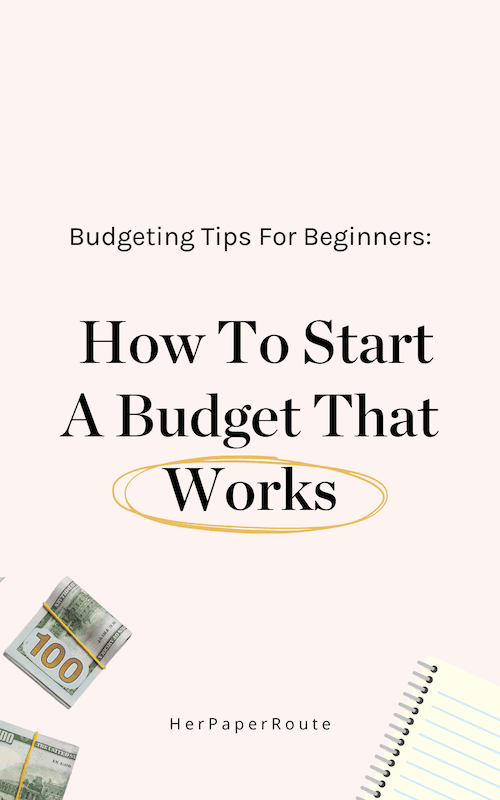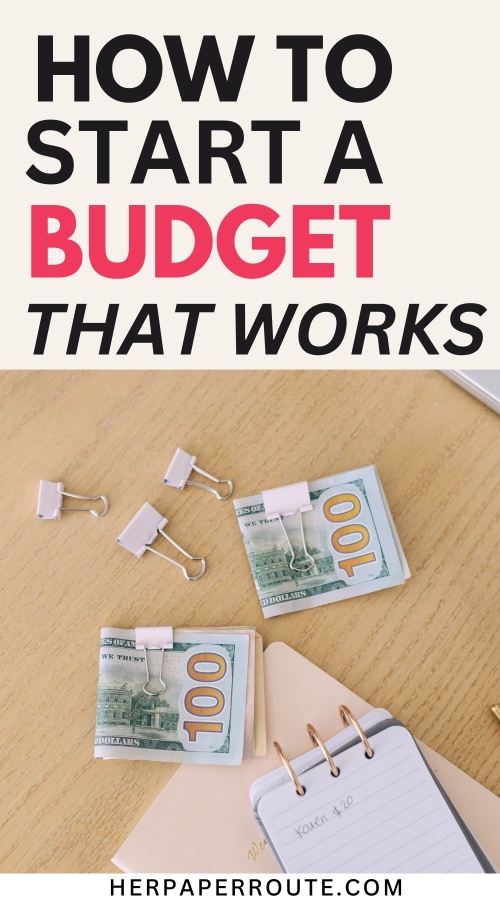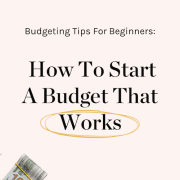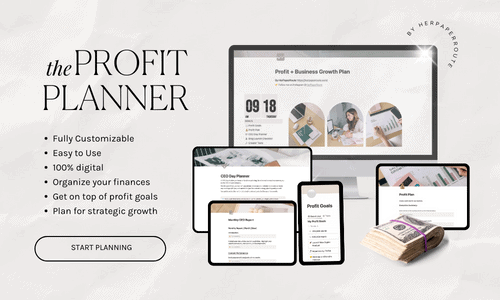Budgeting Tips For Beginners: How To Start A Budget That Works

Learning how to budget can seem rather overwhelming to beginners at first. But there’s no need to be scared!
Once you start getting your head around a couple of simple budgeting principles, you’ll be able to really start saving money and see a difference in your finances right away.
As an affiliate partner of various brands and sponsored content, HerPaperRoute may earn commission on qualifying purchases. Disclaimer
Here are the best budgeting tips for beginners, which will take you through everything you need to know about starting (and keeping up!) your first-ever budget from scratch.
Tips For Creating A Budget For Beginners
✅ This is the digital budget planner I recommend to start tracking your money today.
How To Set Clear Budget Goals
If you’re reading this article, chances are you’re motivated to start budgeting. Maybe you want to finally feel financially secure and stop living paycheck to paycheck.
1. Define Your “Why”
Maybe you want to pay off debt or save up enough for a big trip. Whatever your motivation is, it’s very important to have a clear reason “why.”
This is because budgeting, especially as a beginner, requires conscious effort and repetition. Creating a new habit isn’t always fun. You’re already halfway there if you have your “why” for doing so.
To define your goals, it can help to get visual and put things down on paper. You could draft up a budgeting motivation list, or make a vision board. Whatever you need to do to keep your budgeting goals in mind!
Related: Use These 7 Reasons Why Budgeting Is Important to Inspire You
2. Set Financial Goals
Not only do you need to know why you want to start budgeting in the first place, but it’s also very important to think in terms of specific numbers.
How much debt are you hoping to pay off each month? How much money do you want to put aside in your emergency fund? How much will you be saving to go toward your retirement?
You cannot budget with the vague idea that you want to “save up some money”. Focus on numbers and focus on facts.
3. Make Sure Your Goals Are Realistic
My final tip in defining your budgeting goals is to be realistic. Sure, it’d be great to be able to save $200 a month into your traveling fund or to pay off all your college debt in the space of 2 years.
This may not always be possible unless you are willing to switch to an extremely frugal lifestyle. In order to start a budget from scratch, you’ll have to start small. Its small changes done consistently over time that compound into large wins.
Remember, you can always adjust your budget to save more later. Aim to start with realistic goals, and you’ll be well on your way to becoming a great budgeter!
How To Start Budgeting: Best Budgeting Tips
The following easy budgeting tips will walk you through the process of creating a monthly budget. You could have never budgeted a day in your life; it doesn’t matter. These steps show you a simple but effective way to budget your money.
1. Keeping Track Of Paychecks
There are two basic parts to budgeting: determining your income and determining your expenses. So the first step that you need to take is adding up all your income sources, and figuring out how much money you have to go around each month.
This will include your day job(s), any additional side jobs you take on, and any passive income source(s).
Related: 6 Steps to Easily Keep Track of Bills and Payments
2. Analyze Where You Are Spending Money
Next, you’ll need to figure out where your money is going. A good first step to determine this is to have a look at your bank statement.
Take some time to go through it, and try to see which categories are taking most of your income. Is it entertainment? Going out? Groceries?
Start writing down each purchase you make in a notebook and go through it at the end of the month. These are my favorite budgeting notebooks to organize my finances.
Not only will it give you an accurate idea of where your money is going, but it should also make you more mindful of your spending.
3. Divvy Up Your Paycheck
After you know where your money currently is being spent, it’s time to reassess and make decisions on how much money should be allocated to each budgeting category going forward
Here are the recommended budgeting percentages to get you started.
It’s important to choose realistic amounts for each category. For a budget to be effective, you must stick to it so if the money in a category runs out, you won’t be able to spend more on it until the next month.
To help keep track of your money, download the free monthly budget worksheet below.
So do yourself a favor and have a long, hard look at your eating-out expenses. Should you really be spending that much money on things you could learn to cook for yourself?

4. Incorporate Sinking Funds
When you go through this exercise, you may realize you have upcoming known events that will cost money. This includes Christmas shopping, birthdays, and even bills like life insurance or car maintenance.
For these non-monthly larger expenses, it can be beneficial to plan ahead for them and break up the cost into a monthly amount. Another word for this is a sinking fund.
Here is a list of essential sinking fund categories you can include in your budget.
5. Take Away Temptation To Overspend
If you’re using a debit or credit card, it can be easy to overspend. You aren’t tangibly losing cash during the purchase.
One way to combat this is to use the cash envelope method. You can use this system while starting out or continue with it if you like it. This easy guide walks you through how to use it.
If you end up liking this method and want an easy way to carry the envelopes around with you, then these are the wallets I recommend.
6. Use A Budgeting App To Track Your Finances
This isn’t necessary but is a good option for those who prefer to track their money digitally. There are a ton that you can choose from now, from PocketGuard to Dollarbird.
Your bank may even have an app that you can use that tracks your expenses directly. The great thing about using those is that they can really help you visualize what your expenses are.
It can be quite shocking to notice that 23% of your money is going toward brunch, or just how much you are spending going out on the weekends every month!
With their colorful graphics, not only will these apps give you a clear sense of where your money is going, but they can also make budgeting more fun. Well, as fun as it gets!
Track all of your money in one place and set goals with this financial dashboard.
Planning Your Regular Expenses & Savings
Once you have established where your money is going, you’ll need to make a distinction between recurring expenses and occasional ones. Expenses typically fall into these three categories:
Monthly Expenses
Recurring expenses are things like your water and electricity bills, your rent and your insurance. It can also cover categories like the cost of monthly medicine for regular treatments or paying your dog walker weekly.
Yearly Expenses
Regular expenses are budget items that you know will be occurring in the future. Taxes are one such expense. You know you will have to pay them every year.
Work with an accountant to predict roughly how much you will be taxed in order to save that and about 10% more just in case. You can spread this total amount into a monthly line budget item so it won’t hit you all at once.
Occasional Expenses
Anything else belongs to the category of occasional expenses, meaning they are harder to predict. While you know roughly how much your rent will be 6 months from now, the amount that you spend on groceries can vary widely.
Put your regular expenses down on paper, and make sure that you budget enough to pay them in full each month, with a little wiggle room.
Savings
Savings can fall into monthly, yearly, or occasional expenses. The easiest way to stay consistent would be to set it up as a monthly expense.
I prefer to have it set to auto-draft like I would a recurring bill. This way, I don’t have to think about it and be tempted to spend the money elsewhere.
Learn How To Separate Wants vs Needs In Your Budget
Once you have put money aside toward recurring expenses and savings, you can start thinking about clever ways to use what is now your spending money.
As a beginner trying to learn the secrets of budgeting, this often involves a complete shift in the way that you think about money. More specifically, it involves rethinking the difference between needs and wants.
There are a couple of things which you need to live:
- Food
- Shelter
- Medicine
- Clothing
Anything that involves entertainment, going out, or buying clothes you already have are wants rather than needs.
As a new budgeter, you’ll need to pay attention to your needs first. How much money do you spend on groceries each month? Can that number be cut down?
Next, you’ll need to start thinking about your wants. If your goals are to save more money than you did in the past, you’ll now have less expendable money to spend on your wants.
Related: Easy steps to set and achieve your money goals.
This may be hard to adapt to at first, but it will teach you self-control. As much as possible, stay away from reckless expenses.
This means, don’t impulse shop. It can be a good idea to write down the things which you want to buy and give yourself a couple of weeks to really ponder the reasonableness of that purchase.
Do you really need another rain jacket? Is it reasonable to buy two new sweaters in a month?
Remind yourself that there is a difference between a need and a want.
Wanting something is not a good enough reason to get it. Learn to restrict yourself, and you’ll be well on your way to having a working budget.

Common Budgeting Mistakes
There are two things which we tend to spend way more money on than we should. These are subscription services, and eating out.
Reassess Subscription Services
Subscriptions like Netflix, Spotify, magazines, Headspace, Amazon Prime and all sorts of other services get you to join their program by advertising a low monthly cost.
You will only be spending a couple of dollars a month for a wealth of benefits, they claim. However, these few dollars spent here and there do add up and can make your monthly expenses go up by dozens of dollars.
So take some time to reassess everything that you are subscribed to, and see if there are a couple that you could live without. It’s good to limit your recurring expenses as much as you possibly can.
Are you getting the most out of your Amazon Prime subscription? Prime money-saving hacks you’re not doing.
Be Mindful Of How Frequently You Eat Out
Eating out can quickly become a major expense. Between going out to a fast-food restaurant for lunch, meeting a friend for coffee or dessert, and ordering pizza when you don’t feel like cooking, these expenses can add up to a considerable portion of your income.
One of the best budgeting tips for beginners is simply to learn to cook. A home-cooked meal can be anything from half to a tenth of the price of a restaurant-bought one.
So do yourself a favor and have a long, hard look at your eating-out expenses. Should you really be spending that much money on things you could learn to cook for yourself?

Saving Money For Beginners: A Mindset Change
Now that you understand how to make a basic budget, you can now focus on changing your savings mindset. This is an area that many people struggle with.
Budgeting and saving money is not just about planning all your income and expenses at the beginning and end of the month. It is an ongoing process that can take a bit of time to master.
As a general rule, try to find little things you can do each day to save a bit of money. It could be aiming to take shorter showers to lower your water bill (and help the planet!) or buying unbranded pasta as opposed to the brand which you are used to getting.
Related: Frugal Depression Era money-saving tips you can do today.
These small everyday gestures can add up to big spending over time. Plus, once they become second nature, you’ll be saving money day to day completely and effortlessly!
Reassess Your Budget Regularly
When learning how to start a budget from scratch, it’s important to remember that this is a process as opposed to a one-time thing.
You should reassess your budget regularly, every single month if possible.
First, this is to ensure that your budget is still working for you, that you are saving as much as you can, but not restricting yourself so much that you feel miserable.
Second, you need to adjust it for any unforeseen changes in either your income or expenses. Maybe you lost your part-time job and now have slightly less to spend, maybe your rent went up, or maybe you switched to cheaper insurance.
Whatever it may be, make sure that analyzing and planning your budget is something that you sit down to do on a regular basis. This will ensure that you have the best budget for you, every single month.
Give Yourself Time To Master Budgeting
The final tip in this Budgeting 101 article is to be patient with yourself. You cannot expect to halve your spending in a month.
Neither can you expect budgeting to feel easy in the first few weeks. Learning how to create a budget and stick to it takes time and determination.
So be kind to yourself. Remind yourself that this is a process, and that change takes time.
Starting A Budget From Scratch – Conclusion
The changes you make today may seem hard and at times frustrating, but they will soon develop into a habit that you don’t even have to think about.
Try to keep your motivation for budgeting up by constantly referring to your goals, and have a little self-compassion. Budgeting from scratch can be hard, but it’ll only get easier the longer you keep to it!
Let me know about any struggles you’ve been having with budgeting. What’s keeping you from starting your budget today?
Related Articles:
- Stylish Envelope System Wallets That Make Cash Budgeting Easier
- Holiday Budgeting Tips To Keep From Falling Into Debt
- How To Help Friends And Family Who Have Money Troubles
- Does Gazelle Intensity Actually Work?

Follow along on Instagram!








![17 Advantages & Disadvantages Of A Cash Budget [In Your Day To Day Life] 13 Advantages and Disadvantages Of A Cash Budget](https://herpaperroute.com/wp-content/uploads/2021/11/Advantages-and-Disadvantages-Of-A-Cash-Budget-768x410.png)

![Advantages and Disadvantages of Budgeting [You Need To Know] 15 Advantages and Disadvantages of Budgeting cash and calculator on pink background](https://herpaperroute.com/wp-content/uploads/2021/11/Advantages-and-Disadvantages-of-Budgeting-768x410.png)
